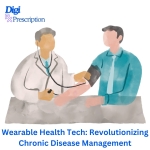Introduction
Technology is transforming healthcare, and wearable health tech is at the forefront of this revolution. From smartwatches that monitor heart health to wearable ECGs and glucose monitors, these devices are playing a crucial role in chronic disease management. They provide real-time health data, early warnings, and personalized insights, helping individuals and healthcare professionals manage conditions like heart disease, diabetes, and hypertension more effectively.
1. Smartwatches for Heart Monitoring
How Smartwatches Are Changing Heart Health
Modern smartwatches do much more than just track steps. Equipped with advanced heart monitoring features, they can detect irregular heart rhythms (arrhythmias), abnormal heart rates, and even early signs of atrial fibrillation (AFib).
Key Features in Smartwatches for Heart Monitoring:
✅ Heart Rate Monitoring: Continuously tracks heart rate and alerts users of irregularities.
✅ ECG Functionality: Some smartwatches, like the Apple Watch and Samsung Galaxy Watch, include electrocardiogram (ECG) sensors to detect AFib and other heart conditions.
✅ Blood Oxygen (SpO2) Tracking: Monitors oxygen levels in the blood, useful for individuals with heart disease or respiratory conditions.
✅ Stress and Sleep Tracking: Helps users manage stress levels, which can impact heart health.
Popular Smartwatches for Heart Health:
???? Apple Watch Series 9 & Ultra – Features FDA-approved ECG monitoring.
???? Samsung Galaxy Watch 6 – Includes blood pressure and ECG tracking.
???? Fitbit Sense 2 – Offers continuous heart rate tracking and AFib alerts.
Impact on Chronic Disease Management:
???? Early Detection: Identifying heart issues before they become critical.
???? Remote Monitoring: Doctors can access real-time heart data for better treatment plans.
???? Emergency Alerts: Devices can notify emergency contacts if a serious irregularity is detected.
2. Wearable Tech for Diabetes Management
Continuous Glucose Monitors (CGMs): A Game-Changer for Diabetics
Diabetes management has traditionally required finger-prick blood sugar tests, but wearable glucose monitors (CGMs) are making it easier than ever to track blood sugar levels in real time.
How CGMs Work:
- A small sensor is inserted under the skin to measure blood sugar levels continuously.
- The device transmits data to a smartphone or smartwatch, allowing users to track glucose trends.
- Alerts notify users of dangerous highs or lows, helping prevent complications.
Top Wearable Glucose Monitors:
???? Dexcom G7 – Provides real-time glucose readings with smartphone integration.
???? Freestyle Libre 3 – A painless, needle-free way to monitor blood sugar 24/7.
???? Eversense CGM – A long-term implantable sensor that lasts up to 6 months.
Benefits of Wearable CGMs:
???? Better Blood Sugar Control: Continuous tracking helps users make informed dietary and lifestyle choices.
???? Alerts for Dangerous Levels: Prevents hypoglycemia (low blood sugar) and hyperglycemia (high blood sugar).
???? Reduced Need for Finger Pricks: Improves comfort and compliance, especially for children and older adults.
3. Wearable ECG Monitors: Detecting Heart Irregularities Early
Why Wearable ECGs Are Important
Electrocardiograms (ECGs) traditionally required hospital visits, but now, wearable ECG devices allow patients to track their heart’s electrical activity anytime, anywhere. This is especially beneficial for people with heart disease, arrhythmias, or a history of strokes.
How Wearable ECG Monitors Work:
✅ The device records electrical signals from the heart and detects abnormalities.
✅ Users can send ECG reports to their doctors for remote diagnosis.
✅ Some devices offer instant analysis and emergency alerts if an issue is detected.
Top Wearable ECG Devices:
???? AliveCor KardiaMobile 6L – A portable ECG that provides medical-grade readings and detects AFib.
???? Apple Watch (ECG feature) – FDA-approved and widely used for heart rhythm tracking.
???? Withings ScanWatch – A hybrid smartwatch with built-in ECG monitoring and SpO2 tracking.
Advantages of Wearable ECG Monitors:
???? Early Detection of Arrhythmias: Helps diagnose conditions like AFib before they cause complications.
???? Remote Monitoring: Patients can share data with doctors without frequent hospital visits.
???? Emergency Alerts: Some devices automatically notify emergency contacts if a serious abnormality is detected.
The Future of Wearable Health Tech
Wearable health technology is evolving rapidly, and new advancements are making devices smarter, more accurate, and more accessible. Here’s what we can expect:
???? AI-Powered Wearables: Artificial intelligence will help predict heart attacks and strokes before they happen.
???? Non-Invasive Blood Sugar Monitoring: Companies like Apple and Samsung are working on smartwatches that track glucose levels without a sensor.
???? Personalized Health Insights: Future wearables will offer customized health recommendations based on real-time data.
These innovations could dramatically improve chronic disease management, reducing hospital visits and helping patients take control of their health.
Conclusion
Wearable health technology is revolutionizing chronic disease management, providing real-time monitoring for heart disease, diabetes, and other conditions. Smartwatches, continuous glucose monitors (CGMs), and wearable ECGs are empowering users with data-driven health insights, leading to earlier detection, better treatment, and improved quality of life.
As technology advances, wearable health devices will become even more accurate, accessible, and essential in managing chronic diseases.
???? What do you think about wearable health tech? Would you use a smartwatch for health tracking? Let us know in the comments!
References:
- American Heart Association – Wearable ECG & Heart Monitoring: www.heart.org
- Diabetes Research Institute – Continuous Glucose Monitoring: www.diabetesresearch.org
- FDA-Approved Wearable Health Devices: www.fda.gov
- Harvard Medical School – The Future of Smart Health Tech: www.health.harvard.edu

